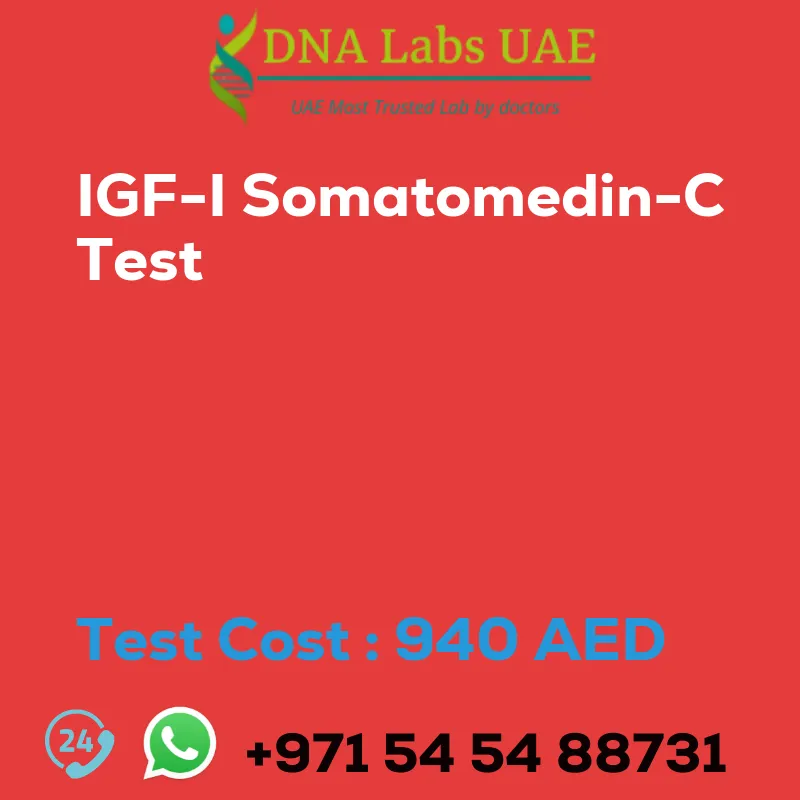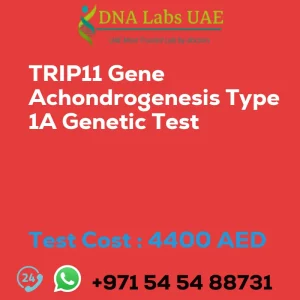IGF – I SOMATOMEDIN – C Test
Test Name: IGF – I SOMATOMEDIN – C Test
Components: Price 940.0 AED
Sample Condition: 2 mL (1 mL min.) serum from 1 SST. Separate serum within 1 hour of collection and FREEZE. Ship frozen. DO NOT THAW.
Report Delivery: Daily
Method: Chemiluminescent Immunoassay
Test type: Disorders of Growth
Doctor: Endocrinologist
Test Department: THYROID & HORMONES
Pre Test Information: No special preparation required
Test Details:
IGF stands for Insulin-like Growth Factor. It is a hormone that plays a crucial role in growth and development. IGF is produced in the liver and other tissues in response to stimulation by growth hormone.
I SOMATOMEDIN-C, also known as IGF-1, is a test that measures the levels of IGF-1 in the blood. This test is often used to evaluate growth disorders in children and to assess growth hormone therapy in adults.
The IGF-1 test is also used to diagnose and monitor conditions related to growth hormone deficiency or excess. It can help determine the cause of short stature, delayed puberty, and growth hormone disorders.
The test involves drawing a blood sample from the patient and sending it to a laboratory for analysis. The results are typically reported as a reference range, which compares the patient’s IGF-1 levels to those of a healthy population.
Abnormal IGF-1 levels can indicate various medical conditions. Low levels may suggest growth hormone deficiency, malnutrition, liver disease, or chronic kidney disease. High levels can be seen in acromegaly (excess growth hormone production), gigantism (excess growth hormone production in children), or certain tumors.
The IGF-1 test is a valuable tool in assessing growth and development disorders and monitoring the effectiveness of growth hormone therapy. It is usually performed in conjunction with other tests, such as growth hormone stimulation tests, to provide a comprehensive evaluation.
| Test Name | IGF – I SOMATOMEDIN – C Test |
|---|---|
| Components | |
| Price | 940.0 AED |
| Sample Condition | 2 mL (1 mL min.) serum from 1 SST. Separate serum within 1 hour of collection and FREEZE. Ship frozen. DO NOT THAW. |
| Report Delivery | Daily |
| Method | Chemiluminescent Immunoassay |
| Test type | Disorders of Growth |
| Doctor | Endocrinologist |
| Test Department: | THYROID & HORMONES |
| Pre Test Information | No special preparation required |
| Test Details |
IGF stands for Insulin-like Growth Factor. It is a hormone that plays a crucial role in growth and development. IGF is produced in the liver and other tissues in response to stimulation by growth hormone. I SOMATOMEDIN-C, also known as IGF-1, is a test that measures the levels of IGF-1 in the blood. This test is often used to evaluate growth disorders in children and to assess growth hormone therapy in adults. The IGF-1 test is also used to diagnose and monitor conditions related to growth hormone deficiency or excess. It can help determine the cause of short stature, delayed puberty, and growth hormone disorders. The test involves drawing a blood sample from the patient and sending it to a laboratory for analysis. The results are typically reported as a reference range, which compares the patient’s IGF-1 levels to those of a healthy population. Abnormal IGF-1 levels can indicate various medical conditions. Low levels may suggest growth hormone deficiency, malnutrition, liver disease, or chronic kidney disease. High levels can be seen in acromegaly (excess growth hormone production), gigantism (excess growth hormone production in children), or certain tumors. The IGF-1 test is a valuable tool in assessing growth and development disorders and monitoring the effectiveness of growth hormone therapy. It is usually performed in conjunction with other tests, such as growth hormone stimulation tests, to provide a comprehensive evaluation. |








